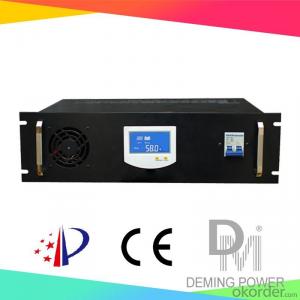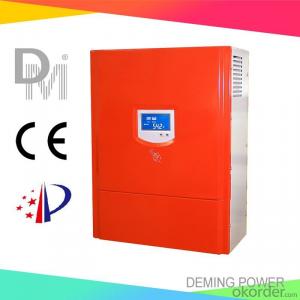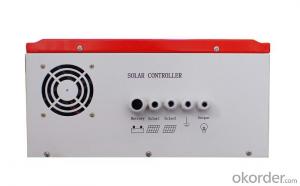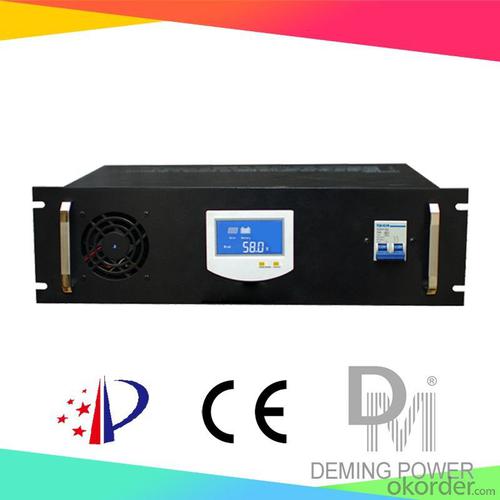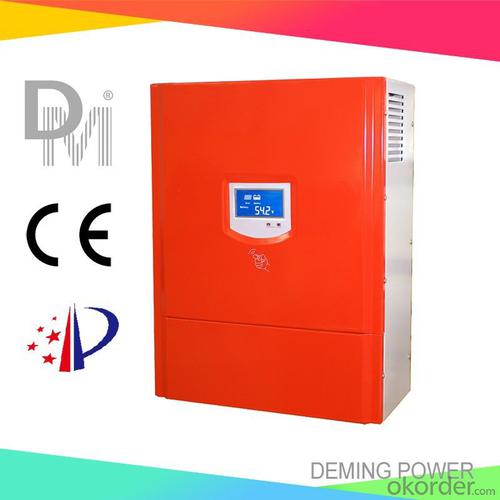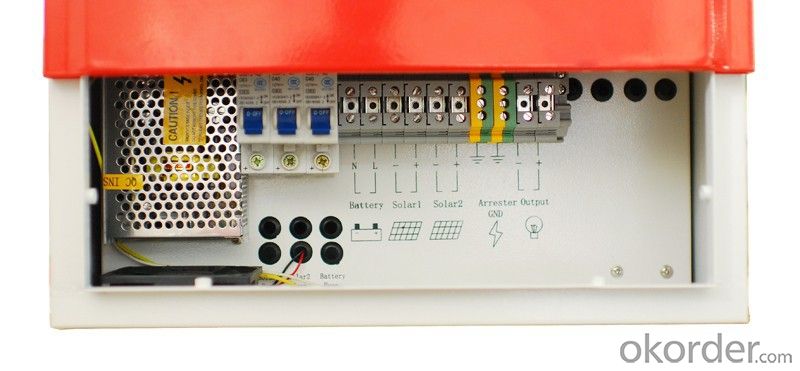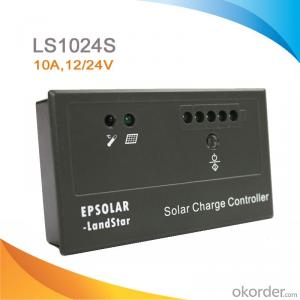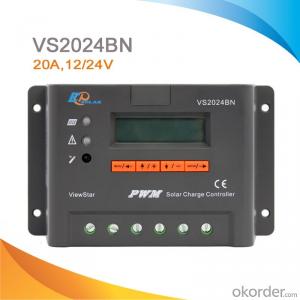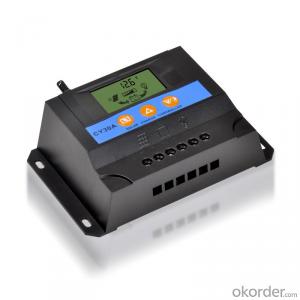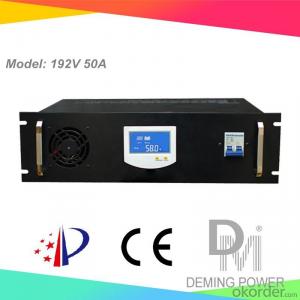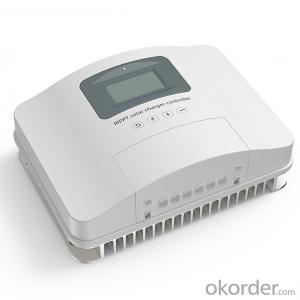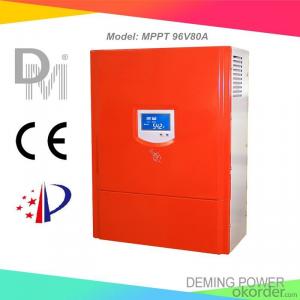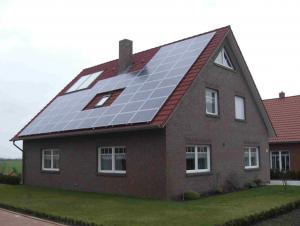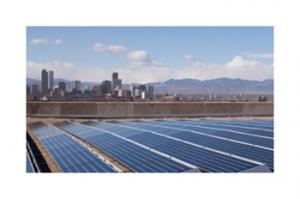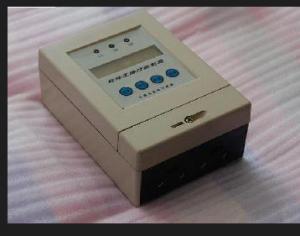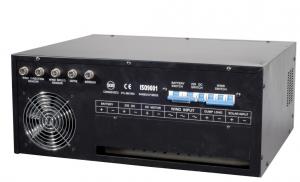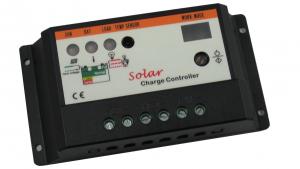Sukam MPPT Solar Charge Controller 192V 30A for Off-Grid Solar Power System with RS485
- Loading Port:
- Qingdao
- Payment Terms:
- TT OR LC
- Min Order Qty:
- 1 PCS
- Supply Capability:
- 1000 PCS/month
OKorder Service Pledge
OKorder Financial Service
You Might Also Like
Properties of the solar charge controller
1. Design for off-grid solar power system.
2. Applicable to different kinds of batteries.
3. Adopts MPPT technology (Maximum Power Point Tracking). The advanced tracking algorithm make the solar module operate at ideal voltage which the solar modules can produce the maximum available power.
4. Modular design with simple structure and easy maintenance.
5. Automatic power control function.
6. LCD display: Solar panel current, solar panel voltage, solar panel power, battery group voltage, charge current.
7. Perfect protection function: Solar reverse charge protection, Solar reverse connection protection, Battery reverse connection protection, Battery overcharge protection, Battery over current protection etc ,thus the system has higher reliability.
Technical parameters of the solar charge controller
Model | 192V30A | ||
Battery group rated voltage | 192Vdc | ||
PV Rated current | 30A | ||
PV open circuit voltage | 500V | ||
PV Max. power | 5760Wp | ||
MPPT input DC voltage range | 150-240Vdc | ||
Input PV module road number | 1 | ||
Function | MPPT charge mode, auto stop charge, auto recharge voltage; Protection: connecting contrary, over current, short circuit, over heat etc. | ||
Display mode | LCD | ||
Display content | solar panel voltage, solar panel current, solar panel power, battery voltage, charge current | ||
Floating Charge Voltage (adjustable) | 110Vdc | ||
Stop charge voltage | 116Vdc±1% | ||
Recharge voltage | 108V±1% | ||
Voltage drop between PV and battery | 1.5V | ||
Max itself power consumption | 100mA-150mA | ||
Work environment temperature | -30-60°C | ||
Relative humidity | 90% No condensation | ||
Applicable altitude | 3000m The rated power should be reduced when it is higher than 2000m | ||
Noise (1m) | 40dB | ||
Degree of protection | IP20(Indoor) | ||
Cooling method | Forced air cooling | ||
*Communication interface (optional) | RS485/USB | ||
*Temperature compensation(optional) | -4mv/°C/2V,-35°C~+80°C,Accuracy:±1°C | ||
Product size (mm) | 520*430*200mm, (Black one) 480*360*150mm, (Red one) | ||
Weight(kg) | 12Kg(Black one) 14kg(Red one0 | ||
*Above parameter only for reference. Could be custom made to user specifications.
- Q: Can a solar controller be used with a generator or other backup power sources?
- Yes, a solar controller can be used with a generator or other backup power sources. The solar controller helps regulate the charging and discharging of the battery bank, ensuring proper management of power from the solar panels, generator, or other sources. This allows for an integrated and efficient utilization of renewable and backup power in off-grid or hybrid systems.
- Q: Can a solar controller be used with solar-powered weather stations?
- Yes, a solar controller can be used with solar-powered weather stations. A solar controller is a device that regulates the charging and discharging of batteries in a solar power system. It ensures that the batteries are charged efficiently and protects them from overcharging or discharging. In the case of solar-powered weather stations, a solar controller is often used to manage the power generated by the solar panels and to charge the batteries that store the excess energy. This ensures that the weather station can operate even during periods of low sunlight or at night when there is no solar power generation. By using a solar controller, the weather station can optimize its power usage and extend the lifespan of the batteries by preventing them from being overcharged or completely discharged. It also provides protection against electrical surges and other potential issues that may arise in a solar power system. Overall, a solar controller is an essential component for managing and maintaining the power supply in solar-powered weather stations, ensuring their reliable operation and continuous data collection.
- Q: Is it necessary to use a solar controller with a small solar panel system?
- Yes, it is necessary to use a solar controller with a small solar panel system. A solar controller helps regulate the charging and discharging of the battery in the system, preventing overcharging and extending the battery's lifespan. It also protects the system from voltage fluctuations and ensures efficient energy conversion, maximizing the system's performance. Therefore, even with a small solar panel system, a solar controller is essential for optimal operation and longevity.
- Q: What is the maximum battery voltage that a solar controller can handle?
- The maximum battery voltage that a solar controller can handle depends on the specific model and its design specifications. However, most common solar controllers can handle battery voltages ranging from 12V to 48V. It is crucial to consult the manufacturer's guidelines or technical specifications to determine the maximum battery voltage that a particular solar controller can handle. Exceeding the maximum voltage can potentially damage the controller and compromise its performance and functionality.
- Q: Can a solar controller be used in hybrid solar systems?
- Yes, a solar controller can be used in hybrid solar systems. A solar controller, also known as a charge controller, is an essential component in any solar power system as it regulates the flow of electricity between the solar panels and the batteries. In a hybrid solar system, which combines solar power with other sources of energy such as wind or a generator, a solar controller is still necessary to manage the charging and discharging of the batteries. The controller ensures that the batteries are charged efficiently from the solar panels and prevents overcharging or over-discharging, thereby extending the battery lifespan. Additionally, a solar controller can also provide monitoring and data logging capabilities, allowing users to track the performance of their hybrid solar system. Overall, a solar controller is an integral part of a hybrid solar system, ensuring optimal energy management and system performance.
- Q: Can a solar controller be used in a solar-powered surveillance system?
- Yes, a solar controller can be used in a solar-powered surveillance system. A solar controller is responsible for regulating the flow of power from the solar panels to the battery storage system. In a solar-powered surveillance system, the solar controller ensures that the battery is charged efficiently and protects it from overcharging or discharging, thereby ensuring uninterrupted power supply to the surveillance equipment.
- Q: How do you prevent overheating of a solar controller?
- There are a few ways to prevent overheating of a solar controller. Firstly, it is important to ensure that the controller is installed in a well-ventilated area, away from direct sunlight or any heat sources. Additionally, using heat sinks or fans can help dissipate excess heat from the controller. Regular maintenance, such as cleaning dust or debris from the controller, can also aid in preventing overheating. Lastly, choosing a solar controller with built-in temperature sensors and automatic shut-off features can provide added protection against overheating.
- Q: Can a solar controller be used with both 12V and 24V systems?
- Yes, a solar controller can be used with both 12V and 24V systems. Most solar controllers are designed to be compatible with a range of system voltages and can automatically adjust the charging parameters accordingly. However, it is essential to check the specifications of the specific solar controller to ensure it supports both 12V and 24V systems.
- Q: Are all solar controllers compatible with all types of batteries?
- No, not all solar controllers are compatible with all types of batteries. Different types of batteries have different charging and discharging characteristics, and as a result, require specific charging algorithms and voltage settings. Therefore, it is important to ensure that the solar controller is compatible with the type of battery being used to optimize charging performance and avoid potential damage.
- Q: How does a solar controller handle electrical noise from the solar panels?
- A solar controller is designed to handle electrical noise from the solar panels in several ways. Firstly, it uses a filtering mechanism to eliminate or reduce high frequency noise signals that can interfere with the controller's operation. This filtering is achieved through the use of capacitors and inductors that absorb or block noise signals while allowing the desired DC power to pass through. Additionally, a solar controller may employ a technique called Maximum Power Point Tracking (MPPT) to optimize the energy harvested from the solar panels. MPPT algorithms continuously monitor the voltage and current output of the panels and adjust the operating point to ensure maximum power extraction. This process inherently minimizes the impact of electrical noise by maintaining a stable and efficient operation. Furthermore, a solar controller may also incorporate various protection mechanisms to safeguard against electrical noise. These protections can include over-voltage and over-current protection, which help prevent damage to the controller and the connected solar panels in the event of a noise-induced surge. Overall, a solar controller's ability to handle electrical noise from solar panels is crucial for ensuring optimal performance and protection. By utilizing filtering techniques, MPPT algorithms, and protective mechanisms, the controller effectively mitigates the impact of electrical noise, allowing for reliable and efficient operation of the solar power system.
Send your message to us
Sukam MPPT Solar Charge Controller 192V 30A for Off-Grid Solar Power System with RS485
- Loading Port:
- Qingdao
- Payment Terms:
- TT OR LC
- Min Order Qty:
- 1 PCS
- Supply Capability:
- 1000 PCS/month
OKorder Service Pledge
OKorder Financial Service
Similar products
Hot products
Hot Searches
Related keywords
